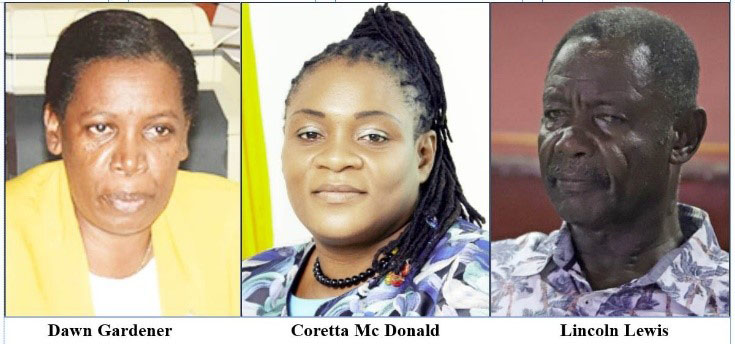Citing the State’s compliance with the law empowering the Central Board of Health to create regulations in relation to the management of COVID-19, and not the Minister of Health, the Unions challenging the President’s exercise of powers under the Public Health Ordinance have withdrawn their action.
The matter filed by the Guyana Teachers’ Union (GTU), the Guyana Public Service Union (GPSU) and umbrella body, the Guyana Trades Union Congress (GTUC) contended that former President David Granger acted outside powers conferred under Section 21 of the Public Health Ordinance when he issued the first COVID-19 emergency measure back in March, 2020.
The case had been previously set for commencement of arguments yesterday.
When it was called, however, counsel for the unions—Darren Wade—informed acting Chief Justice Roxane George that his clients were no longer pursuing the matter, since the State has since complied with the law by remedying the illegality in updated gazetted measures.
In the circumstances, he asked that the application be withdrawn.
He also sought costs but was denied after the Court agreed with submissions from Solicitor General Nigel Hawke that being an application couched in the public’s interest, each party should bear their own costs.
Hawke said, too, that notwithstanding the applicants would have invested time and other resources in preparing their case, it was they who withdrew their application, while adding too, that the Court no longer has to adjudicate on the legal issues.
In granting Wade’s request to withdraw, the Chief Justice noted that the update recorded in the gazette also indicated that the complaint of the applicants had also been overtaken by events and time.
The unions along with GTU General Secretary Coretta McDonald, GTUC General Secretary Lincoln Lewis and GPSU Vice President Dawn Gardener had approached the court with the argument that the President exceeded the powers granted him under Section 21 and via Article 111 of the Constitution.
Their contention was rooted in the specific wording of Section 21, which empowers the Central Board of Health to create regulations to manage the treatment and spread of specific diseases, namely, yellow fever, small-pox, alastrim, cholera, plague and typhus.
Against this background the unions argued that the President is only empowered to make such regulations that the Central Board of Health is itself empowered to make.
“The Coronavirus-2019 is not listed as a disease under the referenced section and [therefore] the direction of the President insofar as it relates to the Coronavirus-2019 is made in excess of the jurisdiction granted to the President to make subsidiary legislation,” the application explained.
Further, they argued that by continuing to delegate to the Ministry of Health the power to create regulations in relation to COVID-19, the President had violated the legal principle of “delegatus non potest delegare”.
While measures for the previous months since March 2020, were under the direction of the President, new measures published in the Official Gazette on Tuesday November 30th, last placed the power to enact the regulations over to the country’s Central Board of Health.
The regulations according to the Gazette order were made by Chairman of the Board of Health, Dr Narine Singh who is also Chief Medical Officer and were approved by President Irfaan Ali.
In its defending affidavit, the State through Attorney General Anil Nandlall SC had argued that given the ravaging effects of the pandemic around the world, it was necessary that the President’s authority under Section 21 to be exercised, to delegate the powers of the Board of Health.
In so doing, the State argued that this allowed Government, through the President’s delegated powers, to continue to take immediate action as needed, and as has been needed since March 2020.
The State had called the unions’ Fixed Date Application (FDA) “frivolous, vexatious, and without merit” and had asked that it be dismissed.
Though the unions complain of the President’s action contravening the law Since March 2020, their action was only instituted last September and their later request for an injunction came after the implementation of COVID measures requiring unvaccinated public servants, including front-line healthcare workers, being denied access to the Georgetown Public Hospital Corporation (GPHC) and other healthcare facilities.
The measures effectively restrict access to public spaces by persons who have not been vaccinated against the COVID-19 virus.
It was against this background that the unions sought an injunction against measures requiring proof of vaccination or a negative test to be provided by public servants before they can access their workplace be declared unconstitutional.
Back in September, however, Justice Fidela Corbin-Lincoln denied the interim injunction.
In her ruling, the judge said that the State has a duty to take steps to avert the spread of the disease and found on this ground that the balance-of-convenience in the interest of the wider public far outweighs the grant of the interim injunction, thus resulting in the Court not exercising its discretion against the COVID measures.
The denial of the injunction has allowed for the continuation of government’s vaccination policy requiring proof of vaccination or a negative test before entry to all places to which the public has access. To those measures, the unions through Wade, had asked for the injunction, citing hardships faced by many who were being locked out of their places of employment and worship, and face risk of arrest for breach of the measures.





